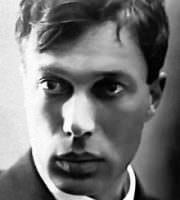About Boris Pasternak
Boris Pasternak was a Nobel Prize and gret modern russian poet and writer. Pasternak's first book of poems, My Sister, Life (1917), is one of the most influential collections ever published in the Russian language. When it finally was published in 1921, the book revolutionised Russian poetry. It made Pasternak the model for younger poets, and decisively changed the poetry of Osip Mandelshtam, Marina Tsvetayeva and others. He continued to change his poetry, simplifying his style and language through the years, as expressed in his next book, Early Trains (1943). Pasternak's post-Zhivago poetry probes the universal questions of love, immortality, and reconciliation with God. Boris Pasternak wrote his last complete book, When the Weather Clears, in 1959. Pasternak was awarded the Nobel Prize for Literature in 1958, an event which both humiliated and enraged the Communist Party of the Soviet Union, which forced him to decline the prize, though his descendants were later to accept it in his name in 1988.Browse all poems and texts published on Boris Pasternak
Outside Russia, Pasternak is best known as the author of Doctor Zhivago (1957), a novel which takes place between the Russian Revolution of 1905 and the Second World War.









